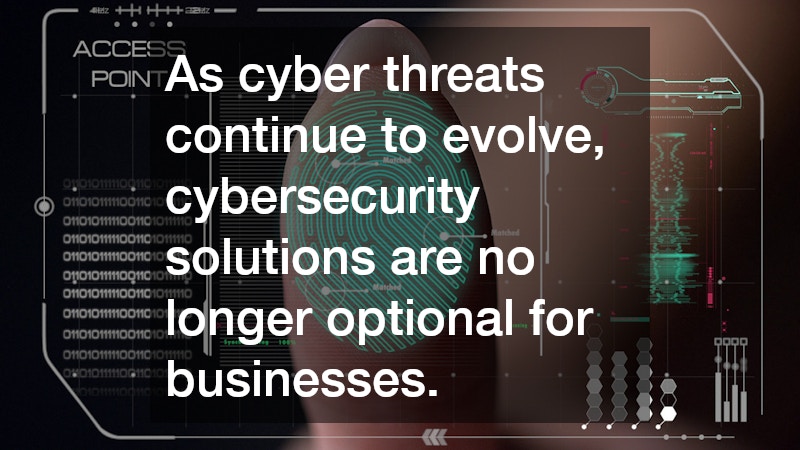In the digital era, businesses rely heavily on technology for daily operations, data management, and customer interactions. While this reliance brings efficiency and scalability, it also exposes organizations to an increasing number of cyber threats. From phishing attacks to ransomware, the landscape of cybercrime is growing more complex and sophisticated. Cybersecurity solutions have emerged as essential tools for businesses to protect sensitive information, maintain customer trust, and ensure smooth operations. This article will explore the nature of cybersecurity solutions, their evolution, and why they are indispensable for businesses of all sizes.
What Are Cybersecurity Solutions?
Definition and Scope
Cybersecurity solutions refer to the technologies, processes, and practices designed to safeguard computers, networks, programs, and data from unauthorized access, attacks, or damage. These solutions aim to ensure the confidentiality, integrity, and availability of critical business information. Cybersecurity is not limited to large corporations; even small businesses handle sensitive data that requires protection from potential threats.
The scope of cybersecurity solutions extends beyond mere virus protection. They encompass risk assessment, vulnerability management, secure access controls, encryption, employee training, and incident response planning. A comprehensive approach ensures that all layers of an organization’s digital environment are protected from internal and external threats.
Types of Cybersecurity Solutions
There are various types of cybersecurity solutions available to meet different business needs. Antivirus and anti-malware programs protect against malicious software, while firewalls act as a barrier between internal networks and external threats. Intrusion detection and prevention systems monitor network traffic for suspicious activity.
Other solutions include encryption tools to safeguard sensitive data, secure access management systems that control user permissions, and cloud security solutions that protect data stored in remote servers. Additionally, endpoint security solutions secure devices such as laptops, smartphones, and tablets, which are common entry points for cyber attacks.
Components of a Strong Cybersecurity Strategy
A robust cybersecurity strategy requires multiple components working together. Risk assessment identifies potential vulnerabilities and threats. Policies and procedures define how employees should handle data and respond to security incidents. Technical tools, such as firewalls, encryption, and antivirus software, provide direct protection against attacks.
Employee education and training are also vital. Human error is one of the leading causes of data breaches, making awareness programs critical. Regular audits, vulnerability scans, and penetration testing ensure the continuous evaluation and improvement of security measures. By combining technology, policy, and training, businesses can build a multi-layered defense system.
How Cybersecurity Solutions Have Evolved
The evolution of cybersecurity solutions reflects the changing nature of cyber threats. In the early days of computing, basic antivirus programs and password protection were sufficient. As the internet expanded and cybercrime became more sophisticated, solutions evolved to include firewalls, intrusion detection systems, and encryption technologies.
Today, advanced cybersecurity solutions leverage artificial intelligence and machine learning to detect unusual patterns and predict potential threats. Cloud-based security solutions allow businesses to protect data across multiple locations, and automated monitoring tools enable real-time threat detection. The modern approach to cybersecurity is proactive, focusing not only on preventing attacks but also on minimizing their impact when they occur.
The Importance of Cybersecurity in Business
Every business, regardless of size or industry, faces cyber risks. Data breaches can result in the loss of sensitive client information, intellectual property, and financial records. Beyond financial losses, cyber attacks can damage a company’s reputation, erode customer trust, and lead to legal penalties for failing to comply with regulations.
Investing in cybersecurity solutions allows businesses to safeguard their assets and operations. Companies with strong cybersecurity measures demonstrate a commitment to protecting their clients and stakeholders, which can enhance brand reputation and credibility. Additionally, well-implemented cybersecurity practices can prevent costly downtime and operational disruptions.
How Do Cybersecurity Solutions Work?
Technical Framework
Cybersecurity solutions operate within a technical framework designed to protect digital assets across multiple layers. At the core are firewalls and secure network architectures that control traffic and block unauthorized access. Encryption protocols secure data during storage and transmission, while authentication systems ensure that only authorized users can access sensitive information.
Detection and Prevention Mechanisms
Cybersecurity solutions utilize various mechanisms to detect and prevent threats. Signature-based detection identifies known malware patterns, while behavioral analysis monitors unusual activity that may indicate a breach. Preventive measures include automatic updates, software patches, and access restrictions. Some advanced systems use artificial intelligence to identify patterns and respond to threats in real time.
Monitoring and Response
Ongoing monitoring is a key feature of effective cybersecurity. Continuous surveillance of networks and endpoints allows organizations to detect suspicious activity before it escalates. Incident response protocols define how a business should react to breaches, including isolating affected systems, notifying stakeholders, and restoring data. This approach minimizes damage and ensures rapid recovery.
Integration with Business Systems
Cybersecurity solutions must integrate seamlessly with existing business systems to be effective. This includes enterprise resource planning systems, customer relationship management software, and cloud storage platforms. Integration ensures consistent protection across all operational areas, reduces vulnerabilities, and simplifies security management.
Real-World Applications
Businesses apply cybersecurity solutions in many ways. Financial institutions use encryption and multi-factor authentication to protect transactions. Healthcare organizations implement secure networks and compliance-focused software to safeguard patient data. Retailers rely on secure payment gateways and fraud detection systems to protect customer information. Across industries, cybersecurity solutions are tailored to meet specific risks and regulatory requirements.
Why Do Businesses Need Cybersecurity Solutions?
Protection Against Data Breaches
Data breaches can have devastating effects on businesses. Cybersecurity solutions prevent unauthorized access to sensitive information, reducing the risk of financial losses, legal liabilities, and reputational damage.
Preserving Customer Trust
Customers expect businesses to protect their personal information. Demonstrating strong cybersecurity practices reassures clients that their data is safe, fostering loyalty and long-term relationships.
Compliance with Regulations
Many industries have strict regulations regarding data protection. Cybersecurity solutions help businesses comply with these requirements, avoiding costly penalties and legal challenges.
Financial Implications of Cyber Attacks
The financial consequences of cyber attacks can be severe. Businesses may face costs related to data recovery, legal fees, customer compensation, and operational downtime. Implementing strong cybersecurity measures mitigates these risks and protects the bottom line.
Staying Competitive in the Market
In a competitive business environment, companies with robust cybersecurity practices gain an advantage. Clients and partners prefer organizations that prioritize data security, creating opportunities for growth and collaboration.
Conclusion
As cyber threats continue to evolve, cybersecurity solutions are no longer optional for businesses. Implementing comprehensive measures protects critical data, maintains customer trust, ensures regulatory compliance, and safeguards financial health. By understanding the importance of cybersecurity and investing in appropriate solutions, businesses can operate with confidence and remain competitive in the digital landscape.




